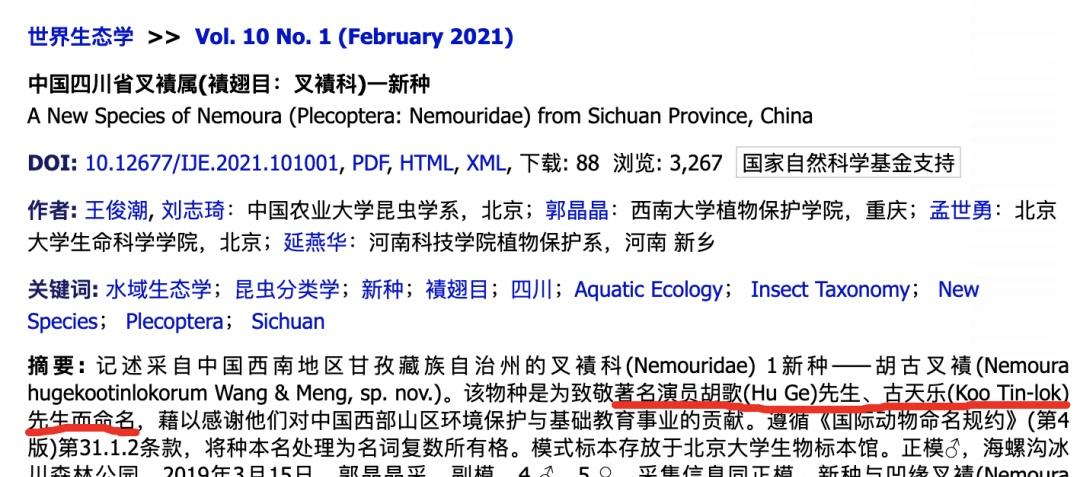Recently, a journal in the field of ecology
World Ecology published an academic article entitled "A New Species of the Genus Pterocarpus (Pterodactylidae: Psoriacephalus) in Sichuan Province, China"
But I didn't expect to receive a lot of attention,
Because the name of this new species is actually made up of
Two stars!

In order to thank the actors Hu Ge and Gu Tianle
Environmental protection in the mountainous areas of western China
Contribution to the cause of basic education
The author will be in the southwestern region of China in the Ganzi Tibetan Autonomous Prefecture
New species of the family Plifiaceae were discovered named
"Nemoura hugekootinlokorum Wang & Meng, sp. nov.)”
According to the article, this new species of the family Plissidae follows Article 31.1.2 of the International Code of Zoological Nomenclature (4th Edition) and is named after the pinyin "Hu Ge" of Hu Ge's name, the pinyin of Gu Tianle's name "Koo Tin-lok" and the Latinized suffix "-orum".
Hugu forked
Distribution area of Hugu fork
Compliance with the International Statute of Zoological Nomenclature
Article 31.1.2 (4th Edition).
Treats the species name as a noun plural possessor
The type specimen is stored in the Biological Herbarium of Peking University
Two stars:
The entertainment industry is a model of low-key charity and public welfare
According to the data on the official website of the Mercy Foundation in Hong Kong, China
Since the 2008 Wenchuan earthquake
Gu Tianle established a charitable foundation
In the past 12 years, it has assisted the establishment of more than 120 schools
Even during the pandemic last year
The Gu Tianle Charity Foundation still supported the construction of 6 schools
Like Gu Tianle, Hu Ge has also personally participated in public welfare undertakings for many years. In 2013, Hu Ge was invited to become the image spokesperson for the Spotted Goose Guardian and Investigation Project. Almost every year since then, Hu Ge will go to Sanjiangyuan to carry out public welfare activities, carrying water, planting trees, picking up garbage...
Last year, Hu Ge also participated in the ecological public welfare project of guarding the G7 highway. The G7 highway is the longest highway in the world to cross the desert, and in order to improve the natural environment of desertification along the way, Hu Ge and other volunteers from the public welfare project went to Ejina Banner in Inner Mongolia to participate in the annual spring planting.
In addition, during the epidemic in 2020, Hu Ge also donated nearly one million medical supplies such as 100 air disinfection machines to Wuhan Children's Hospital.
However, doubts were raised:
Can the discoverers of new species be named at will?
In this regard, Zhao Li, director of the Chengdu Huaxi Entomological Museum, said that according to international practice, the discoverer has the right to name the new species, and its name can be taken almost casually, and even some people use their girlfriends to name the new species they found.
Animals, but what about plants? Plant research experts from the Sichuan Forestry and Grassland Bureau said that the naming requirements for new plant species are also roughly the same as for new animal species.
The new species name consists of 3 words
The second word is optional
"The names of new species of animals can generally be named by the discoverer." Zhao Li said that according to internationally recognized rules, the naming of new species must use uniform Latin. This Latin name consists of 3 words.
The first word is the genus name. This is internationally unified, which taxon the new species belongs to, it must use the genus name of this taxon, must be taken according to the scientific classification basis, can not be changed arbitrarily.
The second word is the species name, which can be taken by the name of various things, such as the shape of this new species, which is very broad and almost arbitrary.
The third word is the last name of the person who published the name.
"Since there is no third word, and the first two words alone can distinguish between different species, the third word is omitted in many places, only in formal articles." The third word actually mainly reflects the respect for the namer. Zhao Li said, such as "Nemoura hugekootinlokorum Wang & Meng, sp. nov.) The third word of this species, Wang & Meng, is actually the sum of the surnames of the two authors, "Wang" and "Meng".
Netizen: I feel that the bugs have become handsome
After netizens learned of this news
Comments have been made:
It feels like the bugs have become handsome
Some netizens said:
Both handsome men are kind and kind